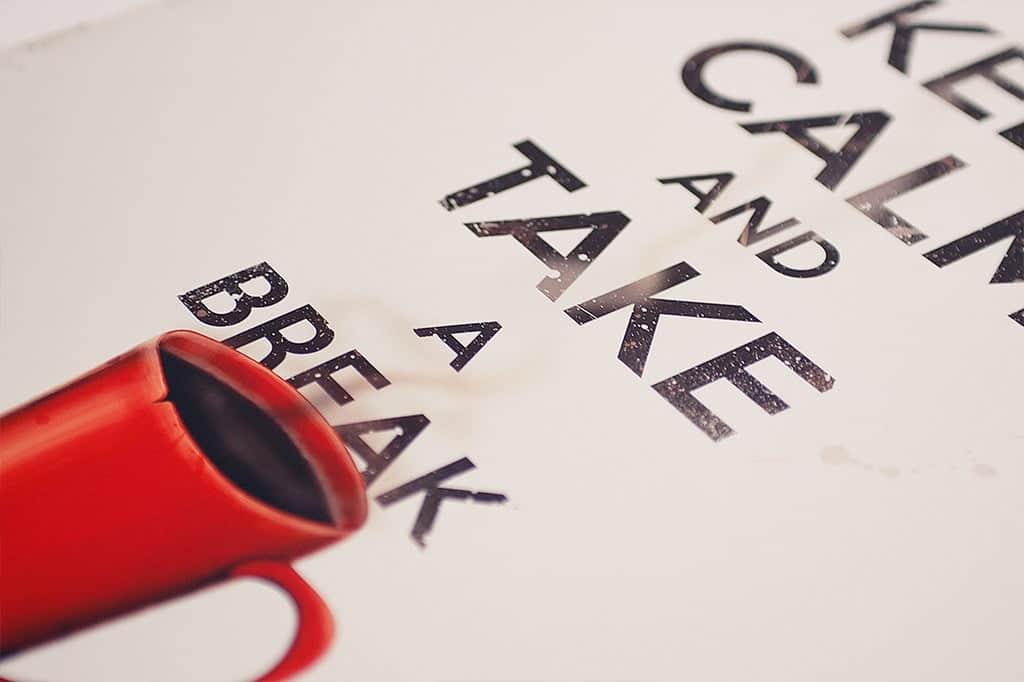You have major deadlines looming ahead of you, a to-do list packed with time-sensitive tasks, and only so many hours in the day to get it all done. In today’s work culture, it’s not uncommon to find people working well over the standard 40 hours per week, rushing to catch up on their workload and hopefully advance in their jobs.
Considering this, it’s no wonder that many workers don’t take enough breaks. We mistakenly think that taking a step away will set us behind or make us look unproductive, so we push through it and keep working in spite of growing exhaustion. But there is a healthier and more efficient alternative: Contrary to what you may believe, breaks actually make you more productive, focused, and even creative.
It’s important to work smarter, not harder. Breaks allow you to do just that. Not only will you feel better – both physically and mentally – you’ll also be able to get more done.
Why Breaks Are So Important
Breaks are vital to your health and to your ability to do your job well. Here are just a few reasons you need to take regular breaks:
- When you work for too long, that puts strain on your muscles and leads to pain. Sitting for too long strains the back and neck – a widespread problem that has dire consequences. Using the computer for too long strains the arms, wrists, and hands. Standing too long is hard on your feet, legs, and back. No matter what kind of work you do, your muscles need a break. If they don’t have regular, frequent opportunities to relax, you’ll develop worse pain – which will ultimately slow you down.
- Your brain is like a muscle, and it will get tired after working for too long. Humans are not biologically or physically wired to focus on one task for very long, and forcing it won’t help. When your brain becomes tired, you will lose concentration, be less able to absorb information, and will be less able to solve problems. This ultimately makes you less efficient and less productive. When you give your mind a break, afterwards you’ll find that you retain information better, are more focused, and are more creative.
- Not taking breaks leads to higher stress, irritability, and long-term health risks like depression, heart disease, and diabetes. But these can be offset by giving yourself time off at work. For your own mental and physical health, it is vital that you take breaks.
When to Take Breaks
The big question is how often you should take breaks and how long they should last. Studies show that it’s important take frequent breaks throughout the day; one half-hour lunch break isn’t enough. Some studies have pointed out that humans have an ability to focus for intervals of about 90 minutes; thus, taking a break every 90 minutes is a good place to start. Other studies suggest that taking a break every hour is better.
Ideally, your breaks should last for at least 15-20 minutes. However, this also depends on the break technique you choose. Some people subscribe to the Pomodoro technique, in which you work for 25 minutes, and then take a 5-minute break. After four sets, you should take a 15-minute break. On the other hand, some studies advocate working for 52 minutes and then taking a 17-minute break.
Additionally, if you work at a computer all day, you should also make sure to stick with the 20-20-20 rule: Every 20 minutes, look at an object 20 feet away for 20 seconds. This will help your eyes rehydrate and relax from the harsh glow of your screen.
Regardless of which method you choose, you should take a break a minimum of once every 90 minutes for 15-20 minutes. In the US, there are no federal guidelines in regards to breaks, though certain states do have rules. Ultimately, it is up to employers to decide how flexible they want to be in giving employees the opportunity to take breaks. Knowing what is most productive will help employers in making the right call. In addition to improved efficiency, it will also speak well of the company as employees will be happier and have higher morale.
How To Make the Most of Your Breaks
Now that you’ve committed to taking your hard-earned breaks, it’s important that you spend your time wisely in order to get the most out of your time off. As long as you’re not staring at a screen, most activities are fair game. Here are some valuable ways to pass the time in ways that will leave you filling recharged and ready to tackle that to-do list:
- Stretch! Working is hard on your muscles, and it’s important to get up and stretch your arms, legs, and back. Not only will this help your muscles relieve tension, it will also get your blood flowing and get oxygen to your brain. Here are 15 valuable office stretches that will help prevent aches and pains from getting worse.
- Take a walk – in nature is best, but even just around your office helps. If you have a flexible schedule, take the time to exercise for an hour. This is especially helpful in the afternoon when you may have a harder time focusing on work; we tend to be sleepiest around 2pm. Getting your blood pumping is great for your concentration.
- Another good way to reenergize is to take a 20-40 minute nap. Again, this is excellent to do in the afternoon – but only if your work environment allows for it!
- Eat or get coffee – food and drink are important to keep you alert and hydrated. Take some time to get something healthy or caffeinated.
- Read, listen to music, or watch a video. Letting your mind wander into an imaginary world is great for relaxing your mind. Pick something light that you enjoy – in this case, fictional books are a better choice than nonfiction.
- Talk to people. Humans are social creatures, and just having a conversation with a friend can help you feel rejuvenated.
Conclusion
No matter how busy you may feel, it’s important that you take breaks throughout the day. You’ll feel better and ultimately be more productive with your time. Don’t feel guilty about breaks, because they help you work more efficiently. It may take a few tries to figure out what kind of break works best for you, but once you find it and make it a habit, you’ll find that you feel better and work better.


